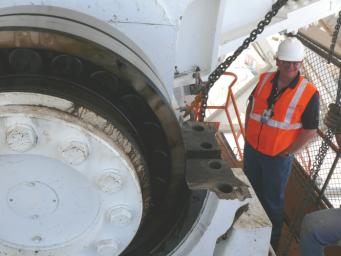
|
Old Elevation Bearings
- Click the image above for a larger view
- Full-Res JPEG (2560 x 1920) (434.6 kB)
- Full-Res TIFF (2560 x 1920) (14.8 MB)
Caption:
The giant "Mars antenna" at the Deep Space Network's Goldstone Deep Space Communications Complex replaced four elevation bearings as part of a major refurbishment. These bearings enable the antenna to tip up from the horizon and back down again.
This image was taken on March 18, 2010.
During the refurbishment, which lasted from March to October 2010, workers also replaced the antenna's hydrostatic bearing assembly, which enables the antenna to rotate sideways.
The 70-meter-wide (230-foot-wide) Mars antenna got its nickname from its first task: tracking the Mariner 4 spacecraft after its historic flyby of Mars in 1966. The antenna's official name is Deep Space Station 14.
Background Info:
JPL, a division of the California Institute of Technology in Pasadena, manages the Deep Space Network for NASA Headquarters, Washington. More information about the Deep Space Network is online at http://deepspace.jpl.nasa.gov/dsn/index.html .
Cataloging Keywords:
| Name | Value | Additional Values |
|---|---|---|
| Target | Earth | Mars |
| System | ||
| Target Type | Planet | |
| Mission | Deep Space Network (DSN) | Mariner |
| Instrument Host | Goldstone Deep Space Communications Complex (GDSCC) | |
| Host Type | Ground-Based Observatory | Flyby Spacecraft |
| Instrument | Deep Space Station 14 | Goldstone Solar System Radar |
| Detector | ||
| Extra Keywords | Color, Radar, Radio, Rotation | |
| Acquisition Date | ||
| Release Date | 2010-11-03 | |
| Date in Caption | 2010-03-18 | |
| Image Credit | NASA/JPL-Caltech | |
| Source | photojournal.jpl.nasa.gov/catalog/PIA13562 | |
| Identifier | PIA13562 | |
